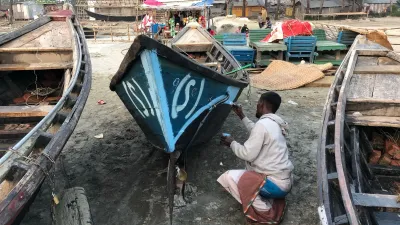Every day thousands of people around the world are helping their communities to navigate information about risk. From Ugandan farmer co-operatives contemplating high-yield banana crops, to weighing up earthquake mitigation measures in Puerto Rican election manifestos and seafarer groups reviewing working conditions in the Philippines, they are all conversations centred around risk.
The people leading such conversations often find themselves trying to help others to navigate complex data and information and make tradeoffs between different outcomes and how likely they are. They are helping their communities to gain risk know-how in practice and in context.
The question is, who is helping them? These community risk practitioners find themselves leading discussions on risk either because of their professional position or of their own volition in response to a particular issue being at the forefront of their community. What challenges do they face when navigating risk information? What support, tools and resources do they need?
In 2019, Sense about Science began working with the Lloyds Register Foundation on the World Risk Poll, looking at how its findings could be made more accessible at the community level. We started consulting people who had been seeking help to communicate risk. They included a vernacular radio host in Kenya helping farmers understand rainfall patterns, an engineer helping rebuild houses post-earthquake in Nepal, and an epidemiologist helping teenagers understand safe sex practices in Boston, USA. We uncovered a huge unmet need for support in finding their way through impenetrable regional, national, and international statistics; when trying to work out concepts like single incident probabilities and the chance of rainfall or recurrence intervals and 1-in-100-year flood.
Armed with these needs and challenges, Risk Know-How, led by Sense about Science, is a project designed to support the people who find themselves in this kind of a role, and to learn from their discussions so that risk information can speak more directly to them. The first step was to develop a framework of what understanding risk entails, based more on the questions that confront people than on a statistics syllabus, but ensuring nonetheless that it had strong backing from leading risk experts.
Over the past year, we have been in conversation with community risk practitioners from all over the world, working across sectors, to test and develop our understanding of what the framework should cover and the kinds of experiences it is relevant to. The resulting practical framework was recently launched in Significance, the international magazine of the Royal Statistics Society, and can be found here: What is risk know-how?
We are now in the process of shaping a global risk know-how community of practice, with a supportive platform for the community risk practitioners to share experiences, ask for guidance, and co-create and access tools and resources. A panorama of one hundred community risk practitioners - the World 100 - will be launched in 2022 to draw attention to conversations about risk in real-world contexts and for the collective learnings and insights to inspire and support others faced with similar situations. At the heart of this initiative is a commitment to facilitating a meaningful dialogue on the gaps between high level expectations and actual community experiences of risk.
If you are working with people at the grassroots level to aid understanding of risk information, Sense about Science invites you to share your experience and help in testing the framework with communities around the world. We are looking to reach people who are leading conversations about risk within their communities. Whether it is a fishing safety facilitator in coastal Bangladesh, a health and safety officer of an offshore oilrig in Ireland, an advisor to a village near Fukushima, Japan following the nuclear accident, or a pharmacist tackling misinformation about healthcare in Canada, we are keen to learn about their experience and support their efforts to help others to make sense of risk. Find out more at www.riskknowhow.org.
Sense about Science is an independent charity that champions the public interest in sound science and transparent use of evidence in policymaking, Risk Know-How is supported by the Lloyd's Register Foundation and colleagues at the Institute for the Public Understanding of Risk at the National University of Singapore.



